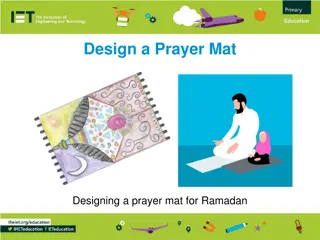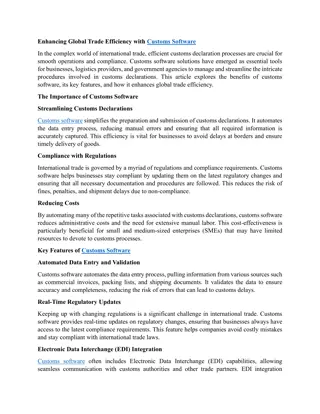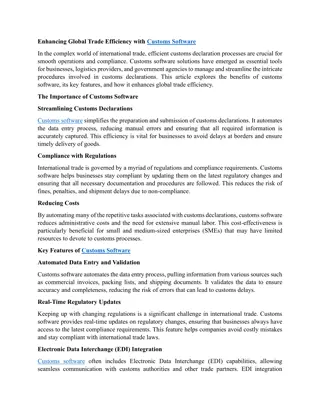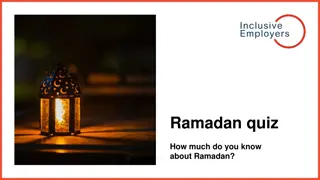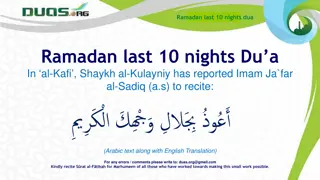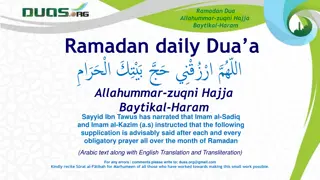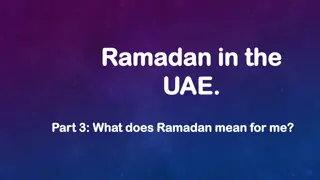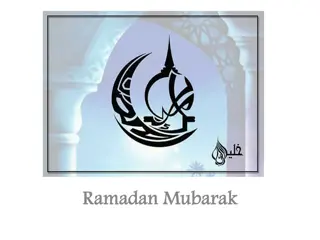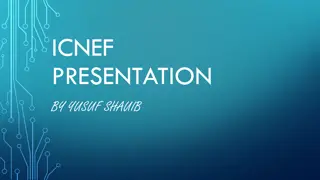Understanding Ramadan: Practices and Customs
Explore the religious practice of Ramadan observed by Muslims worldwide, encompassing fasting, prayer, reflection, and community. Delve into the customs, significance, and celebration rituals of this holy month, fostering self-discipline, empathy, and sacrifice. Compare and contrast cultural/religious practices with insights on fasting as a tool for self-control and discipline.
Download Presentation

Please find below an Image/Link to download the presentation.
The content on the website is provided AS IS for your information and personal use only. It may not be sold, licensed, or shared on other websites without obtaining consent from the author. Download presentation by click this link. If you encounter any issues during the download, it is possible that the publisher has removed the file from their server.
E N D
Presentation Transcript
Ramadan Student Health & Human Services Human Relations Diversity & Equity June 2022
Deep sea diving Would you rather... Bungee jumping
Learn about the religious practice of Ramadan Identify Objectives the customs that are practiced. Discuss our own cultural/religious practices and how they are similar/ different from Ramadan.
It is observed by Muslims all over the world as a month of fasting, prayer, reflection, and community. It is believed that it was during this time that the Quran was given to the Islamic Prophet Muhammad. It is also regarded as one of the Five Pillars of Islam and lasts 29-30 days, from one sighting of the crescent moon to the next. What is Ramadan?
During Ramadan, observers fast from dawn until sunset. Every day, they will have a pre-dawn meal (Suhoor) and will eat again at sunset (iftar). How is it celebrated? There is also a morning prayer and evening prayers. During this time of fasting, observers of Ramadan also abstain from sexual relations, as well as sinful speech and behaviors. Muslims believe that Ramadan teaches them to practice self- discipline, self-control, sacrifice, and empathy for those less fortunate.
The Food The sunset meal (iftar) includes dates to commemorate Muhammad's practice of breaking his fast with 3 dates. Typical main dishes include lamb stewed with wheat berries, lamb kebabs with grilled vegetables, and roasted chicken served with chickpea-studded rice pilaf. Desserts may include luqaimat, baklava or kunafeh. This is considered the most important part of the meal.
Community Over time, the practice of iftar (sunet meal) has evolved into banquets that may accommodate hundreds or even thousands of diners. The Sheikh Zayed Grand Mosque in Abu Dhabi, the largest mosque in the UAE, feeds up to thirty thousand people every night.
What is Ramadan?
What do you think about fasting as a religious practice for self-discipline and self- control? What do you think? Do you think that this is something that could be practiced for non-religious reasons as well?
What are some cultural or religious practices that you participate in? Check-out How are they similar or different?
Human Relations, Human Relations, Diversity & Equity Diversity & Equity




